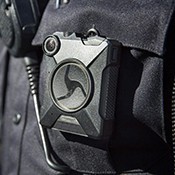 |
|
7/12/2021
|
New law establishes statewide police body cameras program
|
 STATE HOUSE – The General Assembly has approved and the governor has signed into law legislation sponsored by Rep. José F. Batista and Sen. Jonathon Acosta establishing a statewide program for police body cameras. STATE HOUSE – The General Assembly has approved and the governor has signed into law legislation sponsored by Rep. José F. Batista and Sen. Jonathon Acosta establishing a statewide program for police body cameras.
Funding to equip approximately 1,700 of Rhode Island’s uniformed patrol officers —across every police department and the Rhode Island State Police — with body-worn cameras over the next 12 to 18 months has been included in the 2022 state budget.
The legislation (2021-H 6438, 2021-S 0954) ensures that before any of that funding is distributed, regulations for the use of the cameras and the resulting video are established through formal, public rule-making process by the attorney general and Department of Public Safety, in consultation with Rhode Island Police Chiefs’ Association and with input from community members and stakeholders.
Establishment of the program, which has strong backing from Attorney General Peter F. Neronha, is a critical step forward for criminal justice reform, said the sponsors.
“All communities deserve accountability from and trust in law enforcement. Having video footage of encounters has made all the difference in getting to the bottom of some very high-profile cases around the country and right here in Providence. Real justice can only be reached when you can determine what is true, and body cameras are a valuable tool that helps us get to the truth. Statewide use of body cameras will go a long way toward ensuring that our justice system is, in fact, serving true justice and deserving of the public’s trust,” said Representative Batista (D-Dist. 12, Providence).
Said Senator Acosta (D-Dist. 16, Central Falls, Pawtucket), “Trust between the public and law enforcement is essential to a functioning and fair society and as we have recently seen due to increased cultural awareness, this trust has devolved significantly and something must be done to strengthen the bond between residents and those that are tasked with protecting and helping us. The use of body cameras on law enforcement during interactions with the public will go a long way in rebuilding this trust while increasing transparency and accountability in law enforcement, particularly with officers who have broken the law or abused their position. This bill is not a complete and total solution to the serious problems our society is facing, but it is a very good first step in the right direction for those of us who have called for law enforcement reform for quite some time.”
The bill requires that the regulations set by the attorney general and the Department of Public Safety address proper use of equipment; data and equipment security; activation and deactivation of cameras; notification to the public of recording; records retention procedures and timelines, access to data by law enforcement and the public; privacy protections, including redaction procedures; and compliance monitoring.
The new law also ensures the Department of Public Safety, in consultation with the attorney general, establishes the rules on how the funding for the cameras is distributed to police departments. The state budget includes $15 million for the launch of the statewide program and its first five years of operation.
The legislation was developed by Attorney General Neronha’s office following the murder of George Floyd. The Attorney General’s Office worked closely with the Rhode Island Police Chiefs’ Association to research all aspects of implementation, as the State Police and other departments piloted body-worn camera systems. The work was informed by the experience of the Providence and Newport Police Departments, which have both adopted body-worn camera programs over the past several years.
“For over two decades, every criminal case I have evaluated for potential prosecution as a state or federal prosecutor has come down to two critical questions: ‘What happened, and how do I prove what happened?’ If we cannot answer those questions, justice remains elusive, for everyone,” said Attorney General Neronha. “Body-worn cameras thus can be a powerful tool in our efforts to deliver justice. They show us what happened. They promote accountability for police. They provide compelling evidence where prosecution of a member of the public is warranted. They build community trust. We’ll get better results – results in which the public can have confidence – when we can evaluate every police/community encounter from a place of objective knowledge. The statewide body-worn camera program we announce today gives us an opportunity to do just that.”
For more information, contact:
Meredyth R. Whitty, Publicist
State House Room 20
Providence, RI 02903
(401) 222-1923
|
|